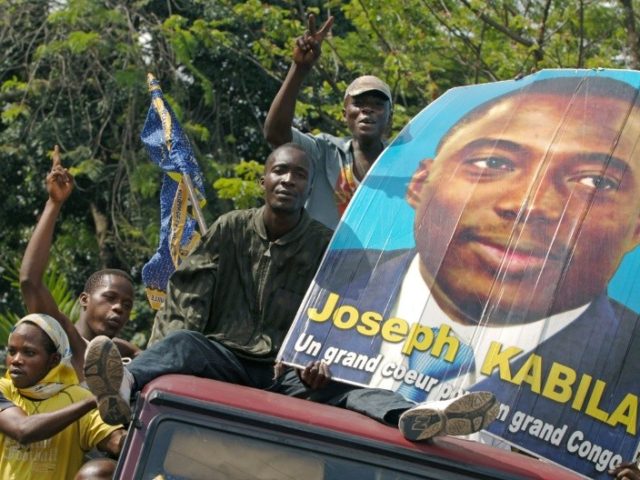Kinshasa (AFP) – Gunfire was heard in DR Congo’s two largest cities as the opposition leader called on citizens to reject President Joseph Kabila whose mandate expired Tuesday with no sign he was ready to leave.
With fears of fresh violence high in the vast and unstable nation, shots rang out in the capital Kinshasa and there was sustained gunfire in the country’s second city of Lubumbashi.
Kinshasa ground almost to a halt Tuesday with people staying at home as groups of youths burnt tyres and built barricades on the streets, AFP reporters said.
Dozens of troop carriers patrolled the megacity of 10 million people and police officers and paramilitaries were out in force in other cities as they have been since Sunday.
Tensions have been soaring ahead of the end of Kabila’s mandate with the international community warning of violence.
France on Tuesday called on the authorities to “respect human rights” after the clashes erupted.
The 45-year-old leader, who has ruled since 2001, is constitutionally barred from seeking a third term but under a controversial recent constitutional court order, he may stay on until a successor is chosen.
An AFP correspondent said the streets of Lubumbashi’s Matuba neighbourhood were strewn with rocks and burnt tyres early Tuesday amid a heavy police presence.
Local authorities in the city added that “police were forced to fire into the air to disperse civilians” because three protesters were armed. It was impossible to immediately verify that claim.
Several people are thought to have been killed in the unrest in various regions, but this has yet to be confirmed.
National police spokesman colonel Pierre-Rombaut Mwanamputu told AFP he was unable to give an immediate toll after the violence.
“Fortunately, we are not back to the slaughter of September,” he said, referring to September’s bloodshed when at least 53 anti-Kabila protesters died in two days of protests, according to the UN.
As the clock ticked on Tuesday’s end-of-mandate deadline, crowds had gathered before midnight Monday to blow whistles and beat on improvised drums, calling on Kabila to quit.
“There was teargas and gunfire, they threatened the population,” said Andre, a resident of Kinshasa’s Matete neighbourhood on Tuesday.
State television overnight announced the formation of a new government in line with an October deal between the ruling party and tiny fringe opposition groups to leave Kabila in office pending elections in April 2018.
But the main opposition bloc rejects this plan.
The new cabinet will be led by Sami Badibanga, a defector from the party of the mainstream opposition party led by 84-year-old Etienne Tshisekedi.
– ‘Caving in to pressure’ –
In a YouTube video released during the night, Tshisekedi launched “a solemn appeal to the Congolese people to no longer recognise the authority of Mr. Joseph Kabila, to the international community to no longer deal with Joseph Kabila in the name of the Democratic Republic of Congo”.
Valentin Mubake, a close aide to Tshisekedi, confirmed to AFP that the video was authentic, and said it was filmed in the Kinshasa district where he lives.
The message was not available in the DR Congo where authorities since Sunday have imposed controls on pictures and video on social media networks.
The leader of the Union for Democracy and Social Progress (UDPS) said he hoped to continue talks that were launched by the Catholic Church last week to find a peaceful solution to the crisis.
The talks were halted on Saturday with no significant progress made, but were due to resume on Wednesday.
Tshisekedi’s opposition grouping had threatened to bring people onto the streets from Monday if the talks had failed.
A democratic handover would break new ground for DR Congo’s 70 million people who since independence from Belgium in 1960 have never witnessed a democratic transfer of power following polls.
The president has been in office since his father Laurent Kabila’s assassination in 2001. He was elected in 2006, and again in 2011, in a poll the opposition decried as rigged.
Some two decades ago, Congo collapsed into the deadliest conflict in modern African history, its two wars in the late 1990s and early 2000s dragging in at least six African armies and leaving more than three million dead.

COMMENTS
Please let us know if you're having issues with commenting.